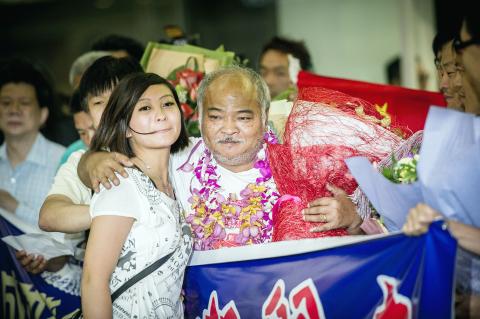In a statement contrary to its repeated stance that Taiwan does not team up with China in defense of sovereignty over the contested Diaoyutai Islands (釣魚台), government officials yesterday recognized the recent display of the Republic of China (ROC) national flag by pro-China activists on the islands.
“We thought that the appearance of the ROC national flag on the islands was in accordance with our sovereignty claims over the Diaoyutai Islands,” Deputy Minister of Foreign Affairs Tung Kuo-yu (董國猷) said.
Tung said he also conveyed that view to Japanese representative to Taiwan Sumio Tarui when he called him in on Thursday to express the government’s concerns over Tokyo’s increasing assertiveness over the Diaoyutai Islands.

Photo: AFP
Japan yesterday deported 14 pro-China activists from Hong Kong, Macau and China, who were arrested by Japanese maritime security officers after they landed on the Diaoyutais, known as the Senkaku Islands in Japan, on Wednesday.
The activists carried with them the ROC national flag, the People’s Republic of China (PRC) national flag, the flag of the Chinese Nationalist Party (KMT) and flags representing the Government of the Hong Kong Special Administrative Region and the Government of Macau Special Administrative Region.
Taiwanese activists did not participate in the action, blaming the government for stopping fishermen from renting them boats.
Under instructions handed down by President Ma Ying-jeou (馬英九) via meetings called by National Security Council Secretary-General Hu Wei-jen (胡為真), the government provided food supplies to the pro-China activists on the Bao Diao II “for humanitarian reasons” en route to the Diaoyutais.
Immediately after the pro-China activists were arrested, the Ma administration called for their release “for the sake of maintaining stability of the region.”
In contrast to its statements targeting Japan for being “oblivious” to the contention over the sovereignty of the islands, the Ma administration yesterday appeared to further sympathize with the pro-China activists.
As well as Tung’s comments, Premier Sean Chen (陳冲) said, in response to media queries, that the government looked at any act staged “purely” to assert Taiwan’s sovereignty over the Diaoyutais “from a positive perspective” as long as the act “was not tinged with other motives.”
Chen added that the best strategy was to advocate the East China Sea peace initiative proposed by Ma on Aug. 5, in which he called for all concerned parties to refrain from antagonistic actions, to shelve disputes on sovereignty and to cooperate on exploring resources.
The ministry said the initiative has received a positive response from Tokyo.
“We came to a consensus to reduce tension in the region. Sumio Tarui also said that President Ma’s initiative was well-received in Japan,” Tung said.
Tung said he told Tarui that the government “knew nothing in advance” about the action taken by the pro-China activists “on their own initiative” and that it had not been involved.
He also told Tarui that the government maintains the position that Taiwan does not cooperate with China in its handling of its claim to the islands.

INVESTIGATION: The case is the latest instance of a DPP figure being implicated in an espionage network accused of allegedly leaking information to Chinese intelligence Democratic Progressive Party (DPP) member Ho Jen-chieh (何仁傑) was detained and held incommunicado yesterday on suspicion of spying for China during his tenure as assistant to then-minister of foreign affairs Joseph Wu (吳釗燮). The Taipei District Prosecutors’ Office said Ho was implicated during its investigation into alleged spying activities by former Presidential Office consultant Wu Shang-yu (吳尚雨). Prosecutors said there is reason to believe Ho breached the National Security Act (國家安全法) by leaking classified Ministry of Foreign Affairs information to Chinese intelligence. Following interrogation, prosecutors petitioned the Taipei District Court to detain Ho, citing concerns over potential collusion or tampering of evidence. The

NEGOTIATIONS: Taiwan has good relations with Washington and the outlook for the negotiations looks promising, Minister of Economic Affairs J.W. Kuo said Taiwan’s GDP growth this year is expected to decrease by 0.43 to 1.61 percentage points due to the effects of US tariffs, National Development Council (NDC) Minister Paul Liu (劉鏡清) said at a meeting of the legislature’s Economics Committee in Taipei yesterday, citing a preliminary estimate by a private research institution. Taiwan’s economy would be significantly affected by the 32 percent “reciprocal” tariffs slapped by the US, which took effect yesterday, Liu said, adding that GDP growth could fall below 3 percent and potentially even dip below 2 percent to 1.53 percent this year. The council has commissioned another institution

NEGOTIATIONS: The US response to the countermeasures and plans Taiwan presented has been positive, including boosting procurement and investment, the president said Taiwan is included in the first group for trade negotiations with the US, President William Lai (賴清德) said yesterday, as he seeks to shield Taiwanese exporters from a 32 percent tariff. In Washington, US Trade Representative Jamieson Greer said in an interview on Fox News on Thursday that he would speak to his Taiwanese and Israeli counterparts yesterday about tariffs after holding a long discussion with the Vietnamese earlier. US President Donald Trump on Wednesday postponed punishing levies on multiple trade partners, including Taiwan, for three months after trillions of US dollars were wiped off global markets. He has maintained a 10 percent

TRADE: The premier pledged safeguards on ‘Made in Taiwan’ labeling, anti-dumping measures and stricter export controls to strengthen its position in trade talks Products labeled “made in Taiwan” must be genuinely made in Taiwan, Premier Cho Jung-tai (卓榮泰) said yesterday, vowing to enforce strict safeguards against “origin laundering” and initiate anti-dumping investigations to prevent China dumping its products in Taiwan. Cho made the remarks in a discussion session with representatives from industries in Kaohsiung. In response to the US government’s recent announcement of “reciprocal” tariffs on its trading partners, President William Lai (賴清德) and Cho last week began a series of consultations with industry leaders nationwide to gather feedback and address concerns. Taiwanese and US officials held a videoconference on Friday evening to discuss the